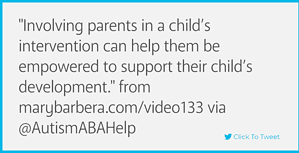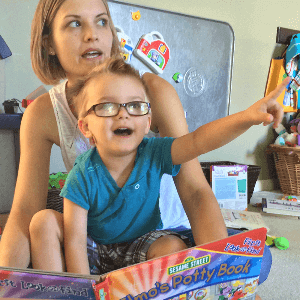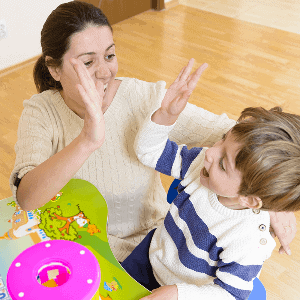As parents, it can be scary when your child is first diagnosed or showing signs of autism. Instead of being scared, we should be jumping on the bandwagon to help our children as early as possible with or without a diagnosis and with or without a therapy team. Parental involvement is critical. But how do we get over that fear to help our children have the best outcome?
Each week I provide you with some of my ideas about turning autism around, so if you haven’t subscribed to my YouTube channel, you can do that now and join the 20,000+ others who already have.
Dr. Melanie Pellecchia is a researcher from the University of Pennsylvania and a Board Certified Behavior Analyst. Dr. Pellecchia has lots of insight around parent involvement in early intensive therapy and the best possible outcomes to help you get out of denial and fear and start helping your child. In fact, I did a full interview with Dr. Pellecchia on autism research and evidence-based intervention as a podcast episode for my autism podcast, Turn Autism Around.
Now that the rate of autism is so high, when Lucas was diagnosed back in 1999, the rate was thought to be 1 in 500 and now it’s closer to 1 in 50, depending on which study you look at, and so there’s such a high rate, there is less stigma attached to getting diagnosed. There’s much more proof that early intervention is really key. To get intensive intervention, a lot of times you need a diagnosis. There’s a very long waiting list for developmental pediatricians. One of the goals of my online course is to provide to parents and early intervention providers some real good, ABA evidence-based strategies, to start making progress with or without a diagnosis and with or without a team of professionals because I really do think that starting with the Lovaas study published in 1987 as well as many of the other subsequent studies that show the power of ABA is the best way to go. Also, a big factor is parental involvement, the dedication and time commitment of a parent, usually a mom.
Dr. Melanie Pellecchia is actually currently researching this area of parental involvement right now. She has an award that is funded through the Institute of Education services, through IES, and an award that is hopefully going to come through from the National Institute of Mental Health. Both are looking at how early intervention providers working in the 0 to 3 system are able to support parents of children who either have autism or who are at high risk for going on to get an autism diagnosis. We’re seeing a lot in the literature about parent-mediated interventions and parents being empowered to support their child’s development. That doesn’t mean they become their child’s primary therapist. We certainly don’t think that’s the case. But I do think that there’s a lot of research showing that parents who are able to learn a lot of the strategies that are going to help their child be successful, are more empowered, have higher self-efficacy, and have less stress. So the more parental involvement there is, the better the outcome. Then we see better outcomes for kids because they have parents who are able to support their communication development all day long instead of just the 10 or 15 hours of therapy time that they’re getting.
Attend a FREE Workshop!
If the parents are integral parts of that intervention then we’re seeing a lot of gains. Melanie’s research is in figuring out the best ways to implement those kinds of parent-mediated interventions within the community settings because what she’s learning is that although a lot of early intervention providers are certainly well-intended and support families as best they can, she thinks there are some evidence-based parent coaching strategies that we know can affect change in parents’ behavior, which would then affect change in their child’s behavior. Those often aren’t implemented in community settings. This is why Melanie’s goal is to help early intervention providers teach parents as opposed to working directly with the child for the bulk of their session.
So how can we collaborate with parents during sessions? How can professionals promote parental involvement? How can we coach them and model and demonstrate and then have the parent demonstrate some of these skills in a way that would show that they were able to implement them successfully? I think this is something that we see as lacking in a lot of the early intervention systems.
I know one of the members of my online course she finally got her son off the waitlist for speech therapy and she drove him 70 miles away to her appointments, this is a 2-year-old with no language, and the speech therapists policy was that the parent couldn’t come back into the room. She was told to wait in the waiting room. The child was having separation anxiety, didn’t know this person, and was screaming the whole way back. I mean she was literally told some parents just go shopping. That’s not my belief. Professionals and parents need to partner together. That’s why everything I do, my book, my podcast, my videos, my online courses are for both parents and professionals because we need the expertise of the professionals but we need the power of the motivation of the parents and the fact that they can provide that 24/7 therapy strategies.
The other point to that is just because you can get speech therapy, ABA, whatever, and just because it’s funded doesn’t mean that person or that place is the right fit. And then parents have to navigate that system. They just got off the waiting list and now they are met with resistance and lack of collaboration. I could tell you stories from hundreds of members of my online courses of frustration with professionals. We need to leave our egos at the door and everybody should just be worried about the child making their best progression.
Something similar that Melanie always tells parents who are navigating the time when they’re getting services for their child is that they should be involved and they should ask to participate in sessions. If they are going to someone that says you’re not allowed to come into the room, then I might question that and say, why and how can I help my son if I’m not allowed to watch what you’re doing? How can I learn what you’re doing? I think that empowering parents to be able to ask those questions and to know that it’s okay to ask those questions is really important. It’s a time where I think a lot of families are just so excited to get services that they don’t want to question those kinds of statements because of fear that they won’t be able to keep that service, which we certainly know we, we shouldn’t be doing as professionals.
If you enjoyed this week’s topic on parental involvement, I hope you give me a thumbs up, share this video/article, leave me a comment and I hope that if you are interested in learning more about how you can join my online course and community, you’ll go to marybarbera.com/workshop and I hope to see you right here next week.
Attend a FREE Workshop!







